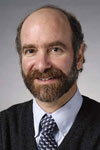Patz to lead campuswide global-health effort
How did pesticide spraying for malaria in Borneo lead to a Typhus fever epidemic? Why did drilling wells for cleaner water lead to widespread arsenic-related skin cancer in Bangladesh?

Patz
In spite of successes like dramatic drops in child mortality and the eradication of smallpox, the global health landscape is rife with complex problems that require solutions that take into account a full spectrum of inter-linkages.
“Too many of our global health interventions are narrowly focused, and as we try to solve one problem, we inadvertently can create two or three more,” says Jonathan Patz, the new director of a campuswide global health effort at the University of Wisconsin–Madison created by the merger of the university’s Center for Global Health and the Global Health Initiative.
The best way forward is through engagement among a diversity of perspectives, including consideration of the political, economic, cultural, socio-demographic, environmental and ethical factors at play, according to Patz.
“UW-Madison, with its many prestigious schools grouped on one campus, is uniquely positioned to grapple with today’s pressing global health challenges,” he says. “I hope to engage related fields across the humanities and the biological, social and physical sciences to pursue root causes underlying the shortcomings of our world’s health.”
A natural inclination to integrating research from disparate fields was key to the selection of Patz — a professor who holds appointments in both the Nelson Institute for Environmental Studies and the Department of Population Health Sciences — to head UW–Madison’s Global Health Institute.
Patz, who shared the 2007 Nobel Peace Prize and the 2006 Zayed International Prize for the Environment for his work on health links to climate and land use change, has led UW–Madison’s International Environmental Affairs and Security Cluster, the Nelson Institute’s Certificate on Humans and the Global Environment, and the Investigators’ Council of the Center for Sustainability and the Global Environment. He was named a Romnes Faculty Fellow in 2009.
The Global Health Initiative results from the campuswide self-assessment for the institutional reaccreditation process. From this exercise emerged a number of themes now being used to guide UW–Madison as it aligns itself to the globalized world of the 21st century.
“During reaccreditation, the campus community identified global health as a vital part of our shared mission,” Provost Paul M. DeLuca Jr. says, and this was the reason behind his and Chancellor Biddy Martin’s Global Health Initiative to add to achievements of the Center for Global Health. “Consolidating the complementary strengths of these two successful initiatives creates synergies that will place UW–Madison at the forefront of global health research, education and service.”
The Center for Global Health was established in 2005 to address strong student interests when there were few organized global health programs at UW–Madison.
Health professional and graduate students were “voting with their feet and eager to understand and contribute to addressing global challenges,” according to Cynthia Haq, the center’s founding director and professor of family medicine and population health sciences. “This summer we will have more than 200 students in the field, and projects in China, Ecuador, India, Thailand, Uganda and elsewhere.”
The center’s work now includes migrant workers and American Indians in Wisconsin and global health certificate programs for graduate and undergraduate students — the latter being under the leadership of the College of Agricultural and Life Sciences. Graduates have joined the World Health Organization, nongovernmental and other international organizations to confront global health challenges.
While the Center for Global Health built its educational offerings, the Global Health Initiative was created with a goal of fostering research relevant to global health that included investigators outside typical health-focused departments.
“Efforts in global health on campus will expand from the more health science-related UW schools to now embrace and leverage scholarship from across all schools, with the goal of assembling the breadth of innovative perspectives required to tackle today’s complex global health issues,” says Jeanette Roberts, dean of UW–Madison’s School of Pharmacy and co-chair of the Global Health Initiative since 2009.
This summer the merged global health institute will announce the winners of a funding competition begun by the initiative as part of its spring Incubator, a series of wide-ranging, thought-provoking discussions of global health concerns led by some of UW–Madison’s brightest researchers. More than 20 research proposals were submitted — from all corners of campus — on the heels of the Incubator.
Many of the highlights in UW–Madison’s history are major contributions to global health — from the discovery of vitamin A and food safety advancements through discoveries that opened the genes of plants, animals and even human beings to generations of researchers.
It’s a legacy that translates easily into a mission for the as-yet-unnamed global health institute: “To work towards sustainable global health — health for today, without compromising resources to assure health for tomorrow,” says Patz, who is confident that alumni and supporters around the globe will embrace the renewed commitment to global health and engage intellectually with faculty and students to build the most collective interdisciplinary response to global health problems yet to be led by an academic institution.




